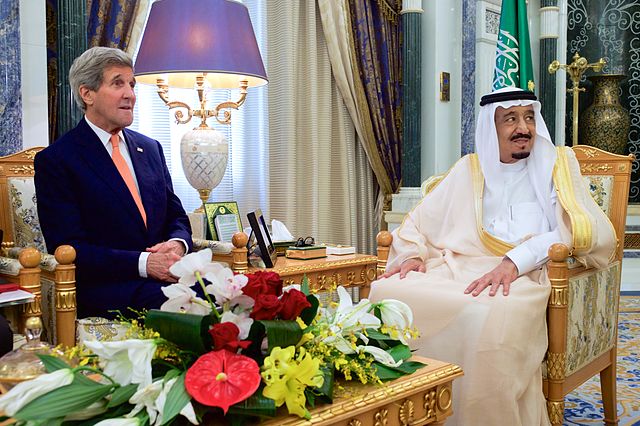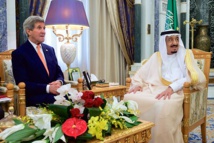It seems that Saudi Arabia has overestimated the impact of low prices on other countries, and was not too concerned about it itself, as its huge reserves were supposed to help go through the hard times.
However, oil has fallen too far. Last CNBC poll showed that traders, analysts and large investors do not expect a rise in oil prices over $ 60 a barrel up to June 2017.
95% believe that Saudi Arabia will not change its course.
At the same time, the kingdom problems themselves are sufficiently important reason to change course, and in addition, there is tension still growing within OPEC.
Situation in OPEC
OPEC is already 54 years old, and, judging by what is happening, the period of existence of the organization is ending. It is already clear that the interests of individual countries began to differ from the interests of all the OPEC. This difference is only growing in the last days.
Saudi Arabia is almost unilaterally decides how to change oil prices. Iran and Iraq have already announced price cuts, and the rest have no choice, no matter what price level they need.
Even the modest level of cooperation between the countries of OPEC, which, until recently, was typical for the organization, had been destroyed by the actions of Saudi Arabia.
Officials in Saudi Arabia believe that the traditional market stabilization method would not work, as countries outside of OPEC may simply increase production. However, if prices remain low, investments will simply fall, which will lead to higher prices in the medium and long term. It is worth nothing, that this actions of Saudi Arabia were also aimed at protecting market share.
A year has passed since the meeting, which surprised the market, and it would be wise to evaluate the policies of OPEC, given the opinion of the countries, that are not among Saudi Arabia’s friends. It is clear that in any case, the kingdom will be supported by Kuwait, the United Arab Emirates and Qatar. Other countries, heavily affected by falling oil prices, are not very pleased to the saved high quota, since their budgets and the economy are extremely sensitive to oil prices, yet they have no reserves so large as Saudi Arabians.
Foreign exchange reserves of Saudi Arabia and the Gulf countries of OPEC account 78% of the reserves of OPEC, or $ 2.73 trillion out of $ 3.05 trillion.
Only Libya boasts the highest GDP per capita in comparison with Saudi Arabia and OPEC countries of the Persian Gulf.
Given that oil prices have nearly wiped out the income of these countries, they almost do not invest in maintaining oil production levels, which means lower rates in the future.
While all the members of OPEC have suffered from the decision, production in Saudi Arabia and its allies was growing. Other countries were faced with either saving it at the same level or even decrease.
The Saudis have increased their share in OPEC, as well, as in the world. In the first half, the kingdom's share in the OPEC countries rose to 26.6% compared with 26% in 2014, while the world's rate increased to 10.4%, compared with 10.2%.
Since 2010, Saudi Arabia is actively increasing its share in general. Within the framework of OPEC, it grew by 3 percentage points, and in the world - by 1.1 percentage points. At the same time, the share of OPEC increased only from 39.2% to 39.5% during this period.
During this period, Saudi Arabia and its allies in the Persian Gulf have increased the total volume of production by 18.1%, while other OPEC countries’ indicators fell by 5.4%.
It looks like maintain market share strategy works for the Saudis and their friends only. Their figure fell by only 0.1%, while others has decreased from 16.7% to 15.2%.
Therefore, other members of the cartel are wondering whether the decision of Saudi Arabia is beneficial to them.
The US and Russia are not planning to reduce production, they increase it.
Given these factors, Saudi Arabia could face a real riot of the dissatisfied OPEC members. And there are three possible scenarios.
Reconciliation
The Saudis have to agree with other members of OPEC to cut production and sharply increase world prices, while Saudi Arabia will bear the brunt.
Ignoring
The Saudis and their allies can simply ignore requests for fellow cartel and force them to wait for changes in market conditions within the supply and demand balance.
Division
If Saudi Arabia and the Gulf countries decide to use their financial well-being and go its own way, the other OPEC countries will not be able to finance their needs, so they will be forced to look for new ways to solve problems. Perhaps one of them is way out from OPEC.
source: businessinsider.com
However, oil has fallen too far. Last CNBC poll showed that traders, analysts and large investors do not expect a rise in oil prices over $ 60 a barrel up to June 2017.
95% believe that Saudi Arabia will not change its course.
At the same time, the kingdom problems themselves are sufficiently important reason to change course, and in addition, there is tension still growing within OPEC.
Situation in OPEC
OPEC is already 54 years old, and, judging by what is happening, the period of existence of the organization is ending. It is already clear that the interests of individual countries began to differ from the interests of all the OPEC. This difference is only growing in the last days.
Saudi Arabia is almost unilaterally decides how to change oil prices. Iran and Iraq have already announced price cuts, and the rest have no choice, no matter what price level they need.
Even the modest level of cooperation between the countries of OPEC, which, until recently, was typical for the organization, had been destroyed by the actions of Saudi Arabia.
Officials in Saudi Arabia believe that the traditional market stabilization method would not work, as countries outside of OPEC may simply increase production. However, if prices remain low, investments will simply fall, which will lead to higher prices in the medium and long term. It is worth nothing, that this actions of Saudi Arabia were also aimed at protecting market share.
A year has passed since the meeting, which surprised the market, and it would be wise to evaluate the policies of OPEC, given the opinion of the countries, that are not among Saudi Arabia’s friends. It is clear that in any case, the kingdom will be supported by Kuwait, the United Arab Emirates and Qatar. Other countries, heavily affected by falling oil prices, are not very pleased to the saved high quota, since their budgets and the economy are extremely sensitive to oil prices, yet they have no reserves so large as Saudi Arabians.
Foreign exchange reserves of Saudi Arabia and the Gulf countries of OPEC account 78% of the reserves of OPEC, or $ 2.73 trillion out of $ 3.05 trillion.
Only Libya boasts the highest GDP per capita in comparison with Saudi Arabia and OPEC countries of the Persian Gulf.
Given that oil prices have nearly wiped out the income of these countries, they almost do not invest in maintaining oil production levels, which means lower rates in the future.
While all the members of OPEC have suffered from the decision, production in Saudi Arabia and its allies was growing. Other countries were faced with either saving it at the same level or even decrease.
The Saudis have increased their share in OPEC, as well, as in the world. In the first half, the kingdom's share in the OPEC countries rose to 26.6% compared with 26% in 2014, while the world's rate increased to 10.4%, compared with 10.2%.
Since 2010, Saudi Arabia is actively increasing its share in general. Within the framework of OPEC, it grew by 3 percentage points, and in the world - by 1.1 percentage points. At the same time, the share of OPEC increased only from 39.2% to 39.5% during this period.
During this period, Saudi Arabia and its allies in the Persian Gulf have increased the total volume of production by 18.1%, while other OPEC countries’ indicators fell by 5.4%.
It looks like maintain market share strategy works for the Saudis and their friends only. Their figure fell by only 0.1%, while others has decreased from 16.7% to 15.2%.
Therefore, other members of the cartel are wondering whether the decision of Saudi Arabia is beneficial to them.
The US and Russia are not planning to reduce production, they increase it.
Given these factors, Saudi Arabia could face a real riot of the dissatisfied OPEC members. And there are three possible scenarios.
Reconciliation
The Saudis have to agree with other members of OPEC to cut production and sharply increase world prices, while Saudi Arabia will bear the brunt.
Ignoring
The Saudis and their allies can simply ignore requests for fellow cartel and force them to wait for changes in market conditions within the supply and demand balance.
Division
If Saudi Arabia and the Gulf countries decide to use their financial well-being and go its own way, the other OPEC countries will not be able to finance their needs, so they will be forced to look for new ways to solve problems. Perhaps one of them is way out from OPEC.
source: businessinsider.com



















